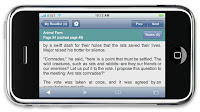Last year, in a seminar, one of my students was using her iPhone while we were discussing Jim Deetz's In Small Things Now Forgotten. I asked her to put the phone away, since class had begun and we were engaged in discussion. But she protested, indicating that she was engaged--the text had been downloaded to her phone, and she was merely following along with the passage I had asked everyone to turn to!
We certainly live in a new world of "reading." I have no moral or philosophical objection to e-books, the digital humanities, etc. In fact, I see the incredible potential of such technologies for creating and maintaining knowledge and fostering new kinds of educational, research, and business. But I have to say that, personally, I still prefer the "hard" form of a book. Flipping pages is an economical and pleasurable means of encountering text that involves not only a particular kind of spatial understanding but also involves familiar sounds (the swish of a turning page), gestures (holding a book in different stances), and materials (glue, cardboard, pulp). I particularly like each book's design identity, implying an intellectual world. Books as singular objects--with form, color, and weight; that I can carry around, have nearby, and consult--supports my understanding of them as a unique and singular utterances of fellow human beings. I fully understand the convenience of having one's entire library in a tablet device, but at the same time, I resist the idea of making "my library" a basic unit of value, like my stock portfolio. I want my library to be chaotic, more about all the amazing ideas and debates in the world to which I often return, puzzled, curious, and seeking connection. I'd rather not have my library conveniently display my investments but rather function as an imperfectly-wrought sanctuary that I can enter for the purpose of discovery, surprise, and encounter.
At any rate, there have been many writers, readers, and critics out there who have compared old and e-books over the past several years. JBMonco had a nice comparison of experiencing Moby Dick in book and e-book back in 2009, for instance. Or author Margaret Atwood:
This is a nice chart from The Daily Beast that compares the economics of the two forms. And now researchers are starting to get in on the debate, studying reading on different devices (including this study from Johannes Gutenberg University in Mainz, Germany). The findings are not surprising. It appears that reading is not simply a cognitive action of information retrieval or even communication, but also involves wider and more complex frameworks of preference, habit, and ritual. That's why thinking about reading has become so significant. Reading is undergoing changes, but those changes are cultural as much as behaviorial.
In the end, it seems to me that to properly assess "what's the best way to read--book or ebook?", we need to move beyond just the mechanics of the behavior to the institutions and ideologies that define reading for us and make it personally and socially meaningful. How are those changing? Are schools, government agencies, or companies requiring the use of ebooks and why or why not? What does it mean to advocate for older forms of print media through newer forms of communication like blogs or YouTube? If the competition between forms continues, will simply making the choice to read a book rather than an ebook become a form of antiquarianism, curmudgeonliness, or rebellion?

No comments:
Post a Comment